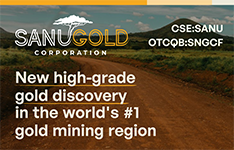Rakovina Therapeutics Inc. (RKV:TSX.V) continues to focus on advancing cancer drug discovery through its proprietary Deep Docking™ AI platform. In a call with Streetwise Reports, Jeffrey Bacha, Executive Chairman of Rakovina, explained how AI is transforming the traditionally slow and resource-intensive drug development process.
These developments follow Rakovina's March 2024 collaboration with Dr. Artem Cherkasov, which granted the company exclusive access to the Deep Docking AI platform for DDR-targeted research. This partnership has allowed Rakovina to optimize discovery timelines and reduce costs while maintaining high precision. The platform, previously validated during the COVID-19 pandemic, screened 1.4 billion compounds in just 20 days. Its inclusion contributed to the rapid development of Paxlovid.
"There are a lot of companies that are employing AI in various parts of drug discovery and drug development. I think the things that differentiate us are the validation behind the deep docking platform," Bacha explained during the call with Streetwise.
Bacha stated that Ravina Therapeutics, as a whole, is not an AI company. Rather, they're a company using an AI tool to better development.
"(The Deep Docking AI platform) is a tool, the star of the show, if you will," Bacha said on the call. "The thing that's going to impact patients and build value for investors is the drug candidates that come out of it. The AI is the way to get us better, faster, cheaper, to that right drug candidate ahead of the other people trying to do the same thing."
On October 23, the company announced it had received its initial shortlist of drug candidates from the Deep Docking platform. These candidates are designed to target DNA damage response (DDR) mechanisms, which are critical in many cancers. The results are being validated in Rakovina's laboratories at the University of British Columbia. There are current plans to advance the most promising candidate into human clinical trials.
Rakovina most recently announced, on November 26, that it had secured over US$800,000 in lead orders from strategic investors for its private placement offering of up to US$1.25 million. The offering, structured as units priced at US$0.05 each, includes one common share and one full warrant per unit, with warrants exercisable at US$0.10 per share for 24 months. Proceeds will support the continued discovery and advancement of cancer treatments, leveraging collaborations with the Deep Docking™ and Variational AI Enki™ platforms, as well as ongoing development of the KT-3000 series through partnerships with biotech and pharmaceutical companies.
"AI dramatically increases speed and the likelihood of success of our drug discovery platform," Bacha stated in the company's October press release. The technology enables Rakovina to evaluate billions of molecular structures within weeks, a task that would otherwise take thousands of years using conventional methods. "This approach allows us to look at the entire haystack, not just a corner of it, increasing our chances of finding the needle," Bacha added.
Rakovina Therapeutics received positive recognition in The Globe and Mail, where it was listed among the top 10 undervalued stocks in the Biotechnology sector on the TSX Venture Exchange.
Their poster presentation, titled Utilizing Artificial Intelligence for the Discovery of Novel PARP1-Selective Inhibitors for Use Against Brain Tumors, showcased how the Deep Docking platform identified drug candidates capable of crossing the blood-brain barrier.
This is viewed as a critical step in treating cancers that spread to the brain. The SNO Meeting, a premier global event attended by over 2,600 researchers, clinicians, and scientists, provided Rakovina with a valuable opportunity to highlight its advancements to a wide and influential audience.
In addition to its work with Deep Docking, Rakovina is collaborating with Variational AI's Enki™ platform to identify inhibitors targeting DDR kinase enzymes. Results from this program are expected in early 2025. Rakovina plans to present a more extensive dataset from both programs at the American Association for Cancer Research (AACR) meeting in April 2025. The company's efforts align with the growing global market for DDR inhibitors, The sector is projected to reach US$18 billion by 2030 according to Precedence Research.
Transformative Innovations and Market Growth In DNA Repair Drug Discovery
According to the National Institutes of Health (NIH), molecular docking has significantly improved drug discovery by enabling the virtual screening of millions of compounds at an accelerated pace. The NIH highlighted that "in silico approaches now enable the virtual screening of millions of compounds in an affordable time, thus reducing the initial costs of hit identification and improving chances of finding the desired drug candidates." This evolution has also opened new opportunities for integrating AI into docking processes, creating refined workflows that enhance the identification and optimization of promising drug candidates.
The Deep Docking (DD) platform, as presented in ACS Publications, utilized AI-driven deep learning models to process vast chemical databases and streamline drug discovery efforts. This method demonstrated a "100-fold reduction of an ultra-large docking database and up to 6000-fold enrichment for the top-ranked hits," dramatically increasing efficiency in identifying high-potential molecules. The ability to process such extensive databases with precision marks a critical advancement in DNA-damage response (DDR) drug discovery.
The DDR drugs market has witnessed remarkable growth potential, as cited in a report by Precedence Research. The global market, valued at approximately US$7.15 billion in 2023, was projected to grow at a compound annual growth rate (CAGR) of 14.40%. That outlook has the industry reaching around US$27.45 billion by 2033. Precedence Research noted that "North America dominated the DNA repair drugs market in 2023," showcasing the region's robust infrastructure and research focus. The report also made mention of the impact of precision medicine in advancing DDR drug development, with PARP inhibitors holding the largest market share due to their effectiveness in targeting BRCA-mutated tumors and enhancing personalized cancer treatments.
Key Catalysts Driving Rakovina
Rakovina Therapeutics' investor quarter 3 2024 investor presentation outlines a series of upcoming catalysts. In late 2024, Rakovina is expected to release additional preclinical data from its PARP1-targeting program, showcasing drug candidates designed to improve upon existing treatments by crossing the blood-brain barrier and reducing side effects.
In early 2025, the company anticipates receiving a second shortlist of candidates targeting additional DDR enzymes, further broadening its pipeline. Presentations at scientific meetings, including the AACR meeting in April, are expected to generate interest from pharmaceutical partners, advancing discussions on potential collaborations.
These efforts align with significant market opportunities, as the global DDR inhibitor market is projected to grow to US$18 billion by 2030. Rakovina's ability to accelerate drug discovery timelines while addressing key limitations of existing therapies positions it as a potential leader in this growing sector.
A Deeper Dive Into Rakovina From Third Parties
Rakovina Therapeutics received positive recognition in The Globe and Mail, where it was listed among the top 10 undervalued stocks in the Biotechnology sector on the TSX Venture Exchange. According to Stockcalc's valuation metrics, Rakovina's stock showed a 20.5% difference between its current price and intrinsic value. This indicated the potential for growth based on fundamental analysis. The company's focus on delivering biomarker-driven oncology treatments and advancing its DNA damage response (DDR) pipeline highlights its innovative approach to cancer therapeutics.
In a YouTube interview with Departure Capital, Rakovina's leadership emphasized the transformative impact of its AI-driven Deep Docking platform. This proprietary technology has been lauded for reducing drug development timelines from years to months while significantly lowering costs. The platform also increases success rates in clinical trials by using extensive public domain data in the DDR space. The company's strategy to develop best-in-class molecules, such as the KT-3000 and KT-2000 series PARP inhibitors, has positioned it in the AI-driven drug discovery corner.
 Streetwise Ownership Overview*
Streetwise Ownership Overview*
Rakovina Therapeutics Inc. (RKV:TSX.V)
The KT, Rakovina's lead program, demonstrated dual functionality that addresses resistance in first-generation PARP inhibitors that would meet critical unmet needs in cancer treatment. Additionally, the KT-2000 series, targeting brain-penetrating PARP inhibitors, aims to create a new standard in oncology therapeutics. These advancements highlight the company's stated commitment within its presentation to leveraging cutting-edge AI technologies for rapid innovation and improved patient outcomes.
Ownership and Share Structure
According to Refinitiv, Newgen Therapeutics owns 26.88% of Rakovina Therapeutics.
Management and Insiders own 4.86%, with the top two being Jeffrey Bacha at 2.05% and Alfredo De Lucrezia at 1.99%.
The rest is retail.
As of November 25, 2024, Rakovina Therapeutics Inc. has a market capitalization of approximately CAD 3.55 million. Over the past 52 weeks, its stock has traded between CAD 0.05 and CAD 0.10.
| Want to be the first to know about interesting Life Sciences Tools & Diagnostics investment ideas? Sign up to receive the FREE Streetwise Reports' newsletter. | Subscribe |
Important Disclosures:
- James Guttman wrote this article for Streetwise Reports LLC and provides services to Streetwise Reports as an employee.
- This article does not constitute investment advice and is not a solicitation for any investment. Streetwise Reports does not render general or specific investment advice and the information on Streetwise Reports should not be considered a recommendation to buy or sell any security. Each reader is encouraged to consult with his or her personal financial adviser and perform their own comprehensive investment research. By opening this page, each reader accepts and agrees to Streetwise Reports' terms of use and full legal disclaimer. Streetwise Reports does not endorse or recommend the business, products, services or securities of any company.
- This article does not constitute medical advice. Officers, employees and contributors to Streetwise Reports are not licensed medical professionals. Readers should always contact their healthcare professionals for medical advice.
For additional disclosures, please click here.










































